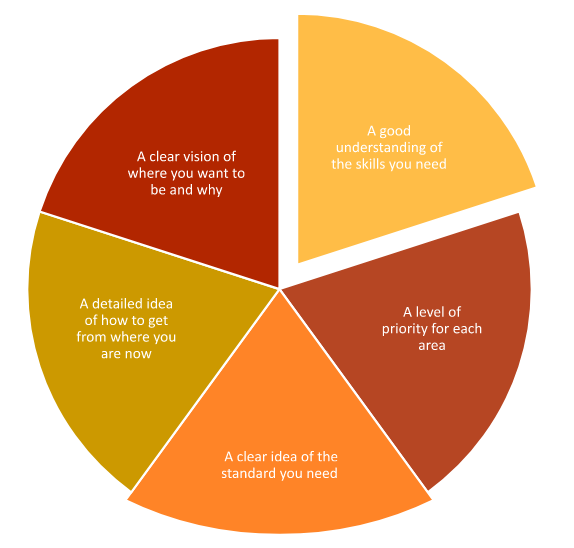Constructing your CMS frameworks

Your individual career management journey is influenced by your formal and informal learning experiences, advices and guidance and using effectively your skills, resources and services offered will equip yourselves to construct your CMS frameworks.

Career Management Skills
Source: Own elaboration
Developing an action plan
There are a number of elements that you need to include in a personal development plan:
1. A clear vision of where you want to be and why
It is certainly useful to think about where you want to be and what you want to do. It can be valuable to think in terms of different lengths of time: for example, one month, six months, one year, five years. It is also helpful to make your image as detailed as possible, across all spheres of life: career, where you want to live, your hobbies and even relationships. The more detail you can contain, right down to how you will feel about it, the easier it will be to hold onto your vision when times are hard.
2. A good understanding of the skills you need to develop to achieve your dream
The next stage to your personal development plan is to think about what skills you need to progress, and why these are important to achieving your vision.
For example:
- Do you need certain skills to get a particular job, or to advance in your chosen career?
- Are you planning to live abroad, and consequently you need to develop your language skills?
- Are you struggling to manage a particular situation, and need new skills to do it?
- Have you been told that you lack particular skills and need to develop them to work effectively with others, or on your own?
It is important to make sure that the skills you are targeting are clearly linked to a purpose, which is in turn linked to your vision. Without this clarity, your personal development efforts may fail. In particular, you may not concentrate on the right skills, or be fully aware of your timescale.
3. A clear idea of the standard you need to achieve, and how different that is from your current standard.
The difference between where you are now and where you need to be told you the magnitude of the task. It therefore affects how long it will take, and also how much effort you need to put in.
For example, if you are planning to move abroad in a year’s time, or go travelling, you may need to develop your language skills. But:
If you have already lived in that country for a period and speak the language well, you may not need to do more than keep your language skills up via listening to foreign radio.
If, however, you have never learnt the language, and you are starting from scratch, you may need some intensive language tuition, or even an immersion course, to ensure that your skills develop quickly enough.
4. A level of priority for each area
You cannot do everything at once. Instead, you need to prioritise. One very good way to do this is to list all your areas for development, then ask yourself two questions about each one, answering on a scale of one to five:
How important is this to me? How essential is it to develop it now?
Add together (or multiply) the scores for the two questions for each area, and you will have a much better idea of which areas to focus on first, because they are either more important, or they are more time-critical.
Leave the other areas for a later date: next year, or even a few years’ time.
5. A detailed idea of how to get from where you are now for each skills or area, to where you want to be.
It sounds obvious, but you need to know how you are going to get from (a) to (b): where you are now, to where you want to be. For example, are you going to enrol on some kind of course? Learn online, perhaps using a website like this one?
Just as with your vision, it can be helpful to break this down by time: in a month/six months/a year, what will you have done on the way to your ultimate goals? This makes it easier to check your progress and keep yourself on track.
To Remind:
When you first start thinking about personal development, it can seem as if you know nothing, and have no skills. You may find this point rather overwhelming!
But it is important to bear two things in mind:
- You do have skills. You have been learning and developing all your life, and you already have many, many skills.
- You don’t have to improve everything all at once. In fact, you’re much better off not trying to do that. Focus on just one or two areas at a time, and you will see much larger improvements, and also feel less overwhelmed.
There is a reason why personal development is sometimes called ‘lifelong learning’: there is no time limit on it.

Source: Own elaboration
The goal of any development activity needs to be identified. You may do this, either, by yourself or with the help of a mentor, career coach, colleagues, or friends.
This includes:
- gaining an awareness of your present standing and future potential within your chosen field or sector
- gaining a measure of what you are good at and interested in (because these things will motivate you)
- taking account of the organisational (and sectoral) realities you encounter
- linking your strategies to organisational (and sectoral) needs as much as possible
Think about:
- your own value system, involving private life and family, work and money, constraints and obstacles to mobility, now and in the future
- the characteristics of the kind of work that fits with your value system.
Now, it is time of putting your plan into action- what you do and how you do it should be your choice. In addition to training courses, options can also include work shadowing, secondment, job rotation, project work, networking and community involvement.
Activity
Goal-setting organizer
Is your goal
- Specific
- Measurable
- Achievable
- Realistic
- Time-based?
Goal:
My goal is to …
Rationale:
I chose this goal because …
Action plan to reach this goal:
I will …
Measurement:
How will I know if I am successful?
Career planning and career test
We all find some activities or topics more interesting than others. Your interests and the way you like to work are important aspects to consider when deciding on a career path. Career quizzes and tests can help you choose, change or develop your career. You can use them as a starting point in your journey to get to know yourself better and explore the wide range of career opportunities available to you.
Activity
Would you like to know better yourself and your career options? Here are different on-line test and quizzes that will help you:
- Personality Test http://www.16personalities.com/
- Abilities Test http://www.assessmentday.co.uk/
- Strengths Test https://high5test.com/
- Self-knowledge test http://www.123test.com/disc-personality-test/
- Career Quiz http://www.123test.com/career-test/
Evaluating your progress
Ensure success in your career management by continuing to evaluate your progress thinking about:
- Learn About Yourself
- What did you learn about yourself through the self-assessments? What was most meaningful?
- How do your values fit with your current career? Which of your values would you like to be more present in your career?
- Have you determined whether your present career is in alignment with your skills and interests? How can you further align them?
- What is your next step in terms of learning about yourself?
- Career Exploration
- How have you used the Internet in your career exploration?
- What resources have you identified and how have they been helpful?
- Have you conducted informational interviews? What did you learn from them?
- What is your next step in terms of career exploration?
- Plan Your Next Steps
- What do you believe has been effective in reaching your short-term and long-term goals?
- Have you discussed your Individual Development Plan (IDP) with your supervisor or other appropriate individuals? What feedback did you receive?
- What is your next step in terms of planning your next steps?
- Take Action
- Did you update your resume even if you are not searching for a new position?
- Which resume format worked best for you? Did you target your resume for specific interviews?
- Did you prepare a cover letter and reference page?
- What is your next step in terms of taking action?
- Evaluate Your Progress
- What have you learned throughout the career management process?
- What do you wish you knew at the beginning of your career management process that you know now?
- After you met your short-and long-term goals, how did you celebrate your successes?
Activity
Write your self-evaluation assessment about your CMS pathway
Self-evaluation assessment
Self-evaluation can be an effective tool for assessing your progress and development in your career management. Self-evaluation assessments can help you see how you have gained knowledge and skills. The self-evaluation is also a way to document your accomplishments for a future employer and company. A self-evaluation can be highly beneficial, as it can provide a way for you to reflect on what skills and behaviours you have improved and what still needs development.
You might also use your self-assessment as a method to keep track of the career projects you have completed successfully as well as any other achievements you have had that you would like to develop.
Consider performing a regular self-assessment as part of your career personal improvement plan so you can keep a current record of how you have performed in your progress and your accomplishments.
How to do it? you may consider the following steps in how to perform your self-evaluation.
1. Include the appropriate elements.
A self-evaluation can include elements such as your success and accomplishments in plan, how you have achieved your success, critiques of your habits, your strengths and weaknesses and aspects that may need improvement.
2. Determine the timeline for your self-evaluation.
You can track your progress yearly, monthly or even weekly. Consider using a notebook, spreadsheet software or another recording method to track your accomplishments as you achieve them.
3. Give insight into your success.
Describe the actions that show your best work, as well as the tasks and projects you have completed that align with the core mission of your plan.
4. Give examples of your strengths and weaknesses.
When performing a self-evaluation assessment, think about what your strengths are and how those strengths helped contribute to your success. In addition to your strengths, consider discussing your weaknesses. List your weaknesses in a way that highlights how you plan to improve upon them.
5. Highlight your growth mindset.
Consider discussing your career goals for the future, your goals for meeting your plan requirements and your strategy for continuing your professional development
6. Give your honest review.
Your self-evaluation assessment should focus on the facts of what you have accomplished as well as what you may need to improve on.
7. Use action words.
A compelling self-evaluation uses action words to convey the strength of the assessment. You might consider using in your self-evaluation words such as “dedicate”, “improve”, “implement”, “incorporate”, “create”, “plan”, “organize”, “manage” or “focus”.
8. Ask for feedback.

